India’s dynamic economy continues to offer abundant opportunities for youth employment across various sectors. This report, part of our Hiring Horizons series, focuses on the latest age-wise hiring data from 2022 to 2024 for over 15 industries, with a detailed analysis of four key sectors: IT/ITES, Business Services, Financial Services, and Retail.
Table of Contents
- 1. Methodology of Analysis
- 2. Key Hiring Insights
- 3. Hiring Insights by Age Group:
- 4. Key Industry Insights
- 5. Key Insights (TL;DR)
- 6. Conclusion
Methodology of Analysis
Our analysis draws from hiring data of over 10,000 Indian companies employing more than 2 million people across various industries. We focused on anonymized and aggregated data from companies with 101 to 10,000 employees. Covering the last three years up to July of this year, the analysis identifies patterns in hiring practices.
To improve accuracy, the data was normalized by calculating the percentage of hires in each age group relative to total annual hiring. This approach helps to balance the overrepresentation of certain industries and offers a clearer view of hiring dynamics.
Key Hiring Insights
Our analysis uncovered several significant patterns in India's hiring landscape, spanning across age groups and industries. These insights provide a comprehensive view of the current job market dynamics.
Hiring Insights by Age Group:
India is Hiring Young: 18-24 Age Group a Major Contributor
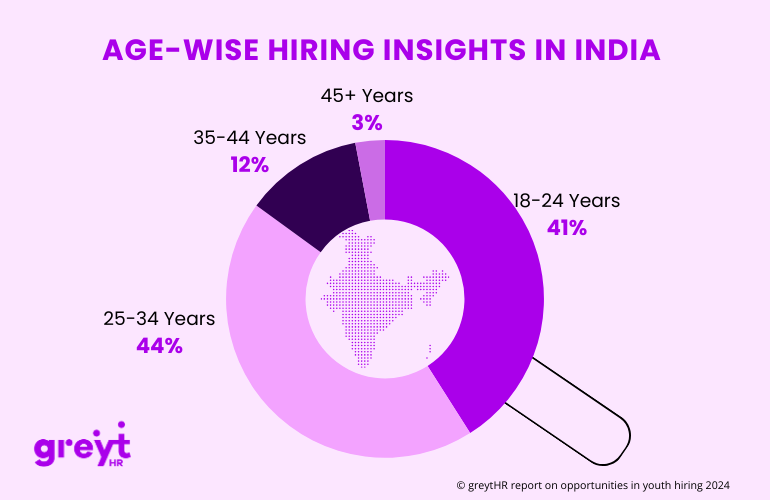
In 2023, 41% of new hires were from the 18-24 age group, making this demographic a major contributor across sectors like IT/ITES, retail, and financial services. These young professionals bring fresh perspectives, adaptability, and technological fluency, essential for entry-level and operational roles.
Mid-Career Professionals Lead the Charge
Representing the largest segment at 44%, the 25-34 age group has emerged as the most sought-after. As companies navigate a complex and rapidly changing market, these professionals are valued for their blend of experience and adaptability. They can step into more complex roles and are often seen as ready to hit the ground running, making them ideal for dynamic work environments.
Seasoned Expertise Still in Demand
Though smaller in proportion (12%), the 35-44 age group plays a critical role in sectors requiring seasoned leadership and strategic oversight. Businesses rely on these professionals to guide long-term strategies and ensure operational continuity.
Niche Demand for Senior Talent
While hiring in the 45+ age group remains limited, averaging around 3.1%, there is steady demand in sectors like education, where deep expertise and stability are crucial.
While age-based trends provide a broad overview, a closer look at industry-specific patterns reveals further nuances in hiring practices.
Key Industry Insights
Retail Leads in Youth Hiring
Retail remains the top employer of young professionals, with around 65.6% of its hires in the 18-24 age group. The sector offers many entry-level positions, attracting younger workers. High turnover rates and the nature of retail jobs—requiring flexibility and customer interaction—make younger employees particularly suitable. Retailers leverage this trend to maintain a workforce that is both energetic and adaptable.
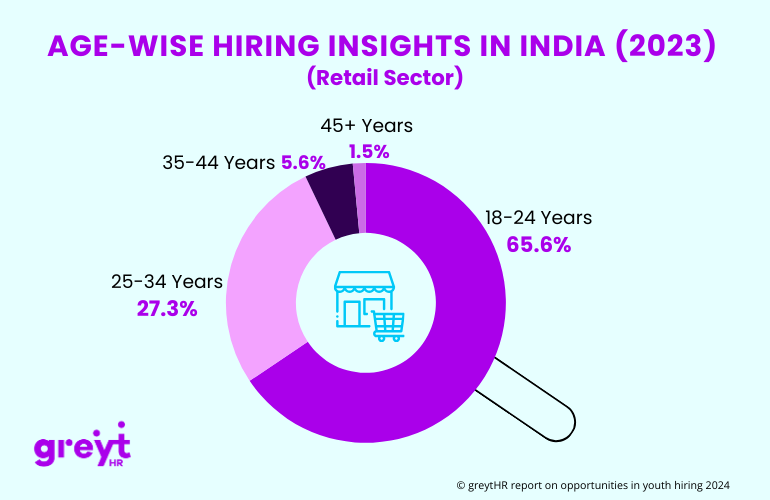
Recently, a retailer reported that 88.86% of its applicants in India were in the 18-30 age group, emphasizing the sector's need for young job seekers.
Financial Services Sector Follows Suit
The Financial Services sector employs a significant proportion of young talent, with 44.9% of hires aged 18-24 in 2023. This trend reflects the industry's need for energetic and adaptable employees, particularly in customer-facing roles and fast-paced environments. Entry-level positions, such as customer service representatives and sales associates, are well-suited for younger professionals, offering them valuable experience and opportunities for growth within the industry.
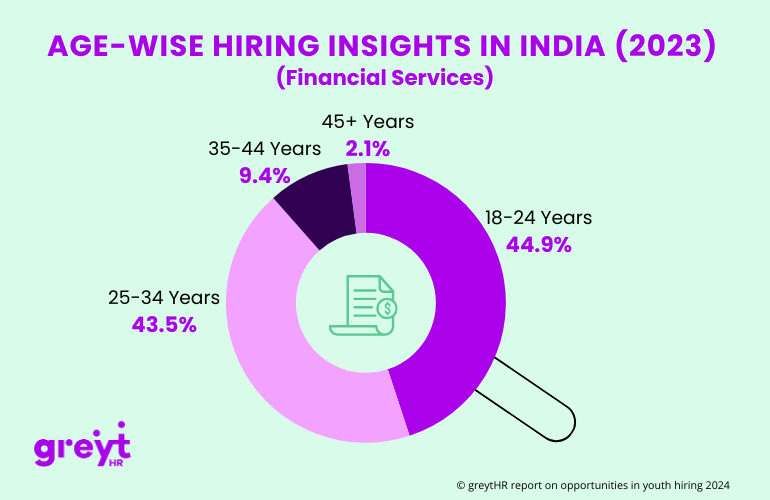
IT/ITES and Business Services Also Employ a Significant Percentage of Young Talent
The IT/ITES and Business Services sectors continue to show a strong preference for young talent, with over 40% of hires coming from the 18-24 age group. These industries rely on energetic, adaptable employees, especially in roles requiring technological agility and customer-facing skills.
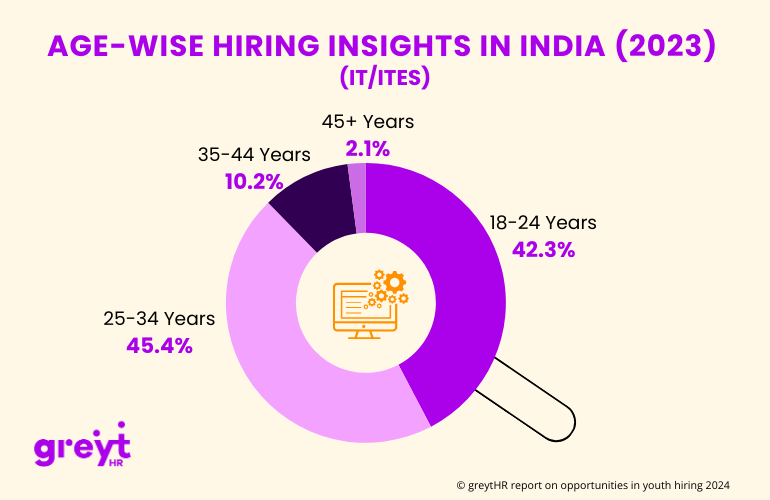
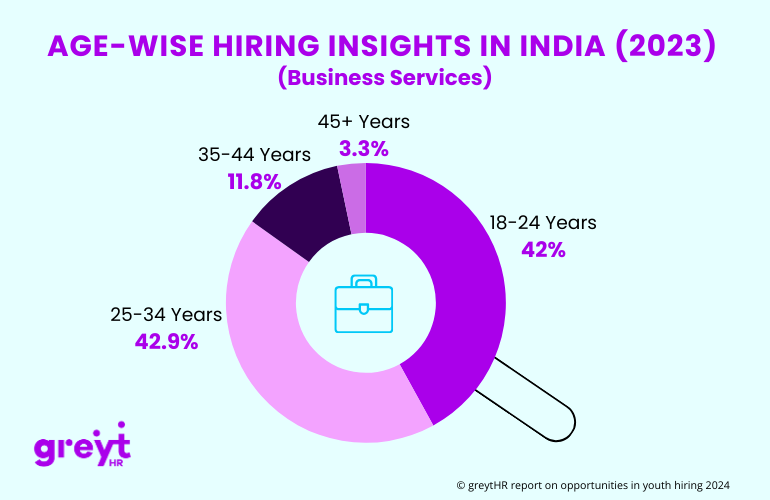
Youth Hiring Declined in IT
The IT/ITES sector, while a key contributor to the economy, has experienced a decline in the 18-24 age group hiring for a company since 2022. As the chart shows, hiring dropped significantly in 2023, with projections for 2024 remaining well below 2022 levels.
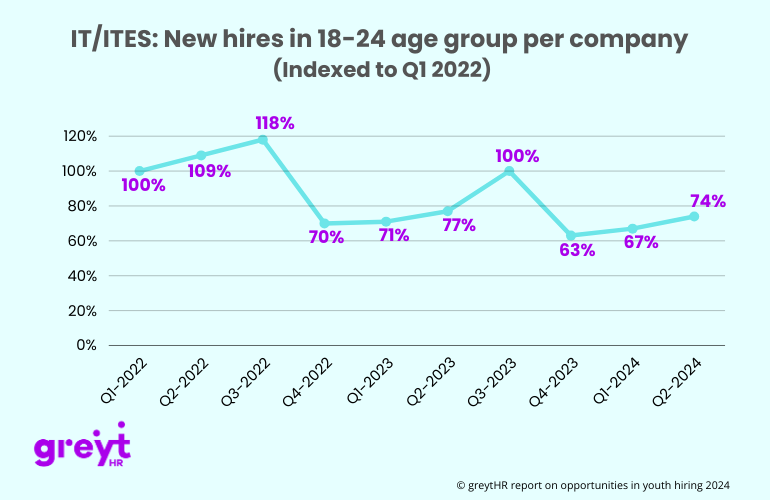
This trend aligns with recent reports indicating a reduction in fresher hiring in the IT sector, likely due to the efficiency gains from AI and automation.
Overall, the service sector shows great opportunities for young professionals. With AI and automation reshaping industries, there is a strong emphasis on upskilling employees to integrate new technologies effectively. The demand for tech-savvy professionals who can adapt and lead in this evolving landscape is increasingly critical for staying employable. For a deeper understanding of the specific skills employers are seeking today, please refer to our earlier Youth Skills in India report.
Key Insights (TL;DR)
Mid-Career Professionals Lead Hiring: The 25-34 age group represents the largest hiring segment at 44%, valued for their blend of experience and adaptability.
Youth Make Up a Large Percentage of Hires: The 18-24 age group accounts for 41% of new hires, making a significant impact across sectors.
Youth Hiring Drops in IT/ITES: Since 2022, hiring of 18-24-year-olds has significantly declined, driven by AI and automation, reducing the need for freshers.
Service Sector Offers Strong Opportunities for Young Professionals:
- Retail: Leads in youth hiring with 65.6% of hires from the 18-24 age group.
- Financial Services: Hires 44.9% of its workforce from the 18-24 age group.
- IT/ITES: 40%+ of hires come from the 18-24 demographic.
- Business Services: Shows similar trends, with over 40% of hires in the 18-24 age group.
Conclusion
As observed, while there has been a dip in IT/ITES hiring, the service sector as a whole continues to present substantial employment opportunities for India’s youth. Mid-career professionals, particularly those in the 25-34 age group, remain the most sought-after, making up 44% of new hires. However, young talent in the 18-24 age group is still essential, representing 41% of new hires, especially in sectors such as Retail, Financial Services, IT/ITES, and Business Services.
For HR professionals, this data emphasizes the need to develop a balanced workforce. Attracting young professionals for entry-level positions is crucial, but equally important is the investment in upskilling existing employees to meet the demands of AI and automation. Understanding which skills are valued in today’s job market is essential for workforce development. Our Youth Skills in India report offers deeper insights.
For young professionals, the service sector continues to offer strong entry-level opportunities. Staying competitive in this evolving landscape will require embracing new technologies and developing adaptable skills. Continuous learning, particularly in tech-driven fields, will be key to career advancement and long-term success.
Disclaimer
The insights presented in this report are based on anonymized and aggregated hiring data from over 10,000 Indian companies, representing more than 2 million employees. The analysis covers hiring trends from 2022 to 2024, with a focus on recent market dynamics.
While every effort has been made to ensure the accuracy of the findings, the data set is limited and may not fully reflect the broader Indian workforce landscape. These findings should be considered directional, offering insights into specific trends rather than comprehensive conclusions. Readers are encouraged to use discretion when applying these insights to broader business or industry contexts.
About greytHR
greytHR is a full-suite HRMS, with the most advanced Payroll and Workforce Management in India and the Middle East region.
greytHR simplifies, expedites, and even automates complex, recurring, and yet critical functions of HR and Payroll, in a compliant and secure way. greytHR offers productivity tools for better people management, simpler HR processes, and professional delivery of HR and Payroll services.
With a broad range of HR products, greytHR is particularly strong in Administrative HR, Payroll, Workforce Management, and Employee Engagement. The platform also offers an app marketplace (to enable affinity use cases), mobile ESS, and lossless implementation. While other HR products barely scratch the surface, greytHR has productized deep and complex HR tasks.
Currently, greytHR is trusted by over 23,000 organizations and 2.3 million users across more than 25 countries, including the UAE, Saudi Arabia, Qatar, Oman, Kuwait, and Bahrain, highlighting its global reliability and effectiveness.

